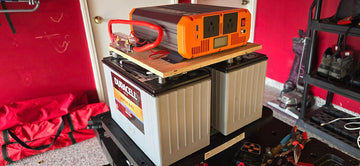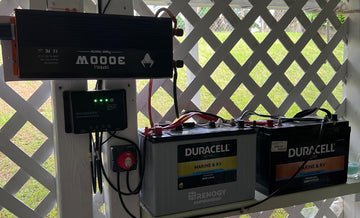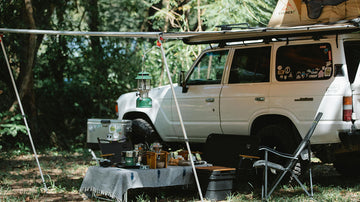AA batteries are one of the most common batteries used today, and you can find these cylindrical batteries in many places, from alarm clocks to children's toys. However, many people don't know much about AA batteries. In this guide, we will briefly introduce the many types of AA batteries, their performance, uses and frequently asked questions to help you make better use of them.
Inside this Article:
- What does AA in batteries stand for?
- Can I charge AA batteries?
- AA battery types and voltages
- Lithium AA batteries vs normal li-ion batteries
- Lithium AA batteries vs regular AA batteries
- How do I charge my lithium AA batteries?
- How much do AA batteries cost
- How do I store my AA batteries?
- Can AA batteries be taken on an airplane?
- Why do AA batteries leak?
What does AA in batteries stand for?
AA is a battery type which means the battery is the size of a double-A. The AA in AA batteries refers to the size of the battery, which is 50.5 mm long and 14.5 mm in diameter.
AA batteries are typically used in single-cell devices or combined in pairs (or larger multiples) to power larger, but still relatively portable, consumer electronics and are extremely versatile.

Can I charge AA batteries?
AA batteries can be primary (disposable) or rechargeable, depending on the material.
Non-rechargeable AA batteries:
Non-rechargeable AA batteries are typically alkaline, zinc-carbon, and Li-FeS2 batteries. These types of batteries are typically used in low-power devices such as remote controls, alarm clocks, and flashlights. Once the batteries are used up, they are usually thrown away.
Rechargeable AA batteries:
Rechargeable AA batteries are usually Ni-Cd or Ni-MH batteries, where multiple identical rechargeable AA batteries are combined to form a larger battery. But Ni-MH is almost certainly the most common rechargeable AA battery today. The once widely used Ni-Cd battery is now increasingly seen as obsolete because of its rather low capacity and toxicity.
Rechargeable AA batteries are generally more expensive than disposable batteries, and common battery pack configurations include 4, 5, 6, 12, or 24 AA cells, assembled in series, parallel, or parallel. However, they can save money and reduce environmental impact in the long run.
However, depending on the material of the battery, aa batteries can also be categorized into different types such as non-rechargeable aa batteries and rechargeable aa batteries. Non-rechargeable batteries are also known as dry batteries. Dry cell batteries are disposable batteries commonly used in daily life, which are lightweight and easy to carry. AA batteries are usually used in portable electronic devices.
AA battery types and voltages
The voltage output of AA batteries varies with their chemistry, which directly affects their compatibility and performance in various devices.

NiCd and NiMH batteries: 1.2V
This voltage is ideal for general consumer electronics that require a stable and reliable power source. Devices designed for NiMH or NiCd batteries work best at this voltage, taking advantage of these batteries' rechargeability and durability
See more: Differences between li-ion and ni-mh batteries
Standard zinc-carbon and alkaline batteries: 1.5V
These batteries are suitable for a wide range of applications, including remote controls, wall clocks, flashlights, and digital cameras. They offer a good balance between cost and capacity.
NiZn (Nickel-Zinc) battery: 1.65V
It is ideal for devices that require more power to improve performance, such as high-power LED flashlights and electronic toys. Higher voltage improves device performance.
Lithium batteries (Li-MnO2 and Li-SOCl2): 3.0-3.6V
It is ideal for high-drain devices such as digital cameras and GPS devices. These batteries offer better performance and longer life.
| Attribute | Nickel-based | Zinc Carbon | Alkaline | Lithium-ion |
| Battery Capacity | 700 - 1,500 mAh | 400 - 1,700 mAh | 2,000 - 3,000 mAh | 3,000 - 3,500 mAh |
| Charging Protection | Does not have a BMS | Disposable battery, not rechargeable | Does not have a BMS | With BMS, prevents overcharging and discharging of batteries |
| Self-discharge rates | High, about 20% per month | Non-rechargeable, no self-discharge rate | Very low, about 5-10% per year | Relatively low, less than 1% per month |
Lithium AA batteries vs normal li-ion batteries
When discussing lithium AA batteries, it is important to distinguish between lithium batteries and lithium-ion batteries. Lithium batteries include a variety of types such as lithium-ion, lithium-polymer, and lithium-sulfur batteries. Lithium-ion batteries are a common rechargeable version of the lithium-ion battery typically found in cell phones, laptops, drones, e-cigarette devices, and a variety of other power-hungry consumer electronics.
Both regular lithium batteries (18650, 21700) and lithium AA batteries are lithium-ion, but they differ in several key ways.
- The size is different, the height of AA batteries is 50mm, and the diameter is 14mm. 18 for 18560 battery means the diameter is 18mm, 65 is the height is 65mm, and 0 means the cylindrical battery. 21700 battery is also a cylindrical lithium battery, the new 21700 battery has a diameter of 21mm, and a length is 70mm.
- Voltage is different, the voltage of AA batteries is usually 1.5V, while the voltage of 18650 batteries and 21700 batteries is usually 3.2V.
- Different cycle life, the cycle life of conventional AA batteries is usually 1000 times, while the cycle life of 18650 batteries and 21700 batteries can reach 4000 times.
- Application scenarios are different, 21700 and 18650 batteries are mainly used in high-power devices such as electric vehicles, power tools, and laptop computers. Lithium AA batteries are commonly used in small portable devices such as remote controls and flashlights.
Lithium AA batteries vs regular AA batteries
| Factor | Regular AA batteries | Lithium AA batteries |
| Ingredients | Regular AA batteries have a different composition. They do not contain lithium. | Lithium AA batteries, on the other hand, have a lithium metal anode and a carbon cathode. |
| Charge | Some regular AA batteries are not rechargeable. | They can be charged and discharged many times |
| Voltage | Common voltages are 1.2V or 1.5V. | They have a slightly higher voltage than normal ones. |
| Capacity | The capacity is small and the energy density is low. | They are more durable due to high energy density, higher capacity, and longer discharge times. |
| Lifespan | These batteries have a shorter lifespan. Ni-mh and nich AA batteries are rechargeable | They last longer and perform better at low temperatures. Long cycle life |
Lithium-ion batteries operate at much higher voltages than most AA battery types, so they should never be placed in a charger designed for AA NiMH or alkaline batteries. Many types of batteries can eventually leak or rupture if placed in the wrong charger, but lithium-ion batteries can catch fire with alarming force if mishandled.
AA lithium batteries have a shelf life of up to 9 years, and in the right device, they last much longer than most other AA batteries. Importantly for the health of your valuable electronic devices, unlike many inexpensive batteries, AA lithium batteries do not leak over time.
How do I charge my lithium AA batteries?

Following these tips before charging will help keep your batteries safe and prolong their life:
- Make sure the charger you buy is suitable for lithium AA batteries, preferably one that is reliable and meets standards. Lithium batteries require special chargers that can handle their higher voltage.
- Once a Lithium AA battery has begun to charge, wait until the charge is complete. Charging time depends on the battery capacity, the charger design, and the current state of charge of the battery. Do not overcharge the battery. Lithium batteries can be damaged if overcharged.
- Do not charge the battery in extreme temperatures.
- Avoid excessive heat during charging to ensure the safety of the battery.
- When the battery is fully charged and ready for use, allow it to cool before using.
How much do AA batteries cost
The price of AA batteries can vary depending on several factors, including brand, type (e.g., alkaline, lithium, etc.), package quantity, and quality. However, here are some general price ranges for reference.
- AA alkaline batteries: In general, alkaline AA batteries are relatively inexpensive, usually ranging from $0.20 to $1.00 per battery, depending on brand and package quantity.
- Lithium AA batteries: Lithium AA batteries are generally slightly more expensive than alkaline batteries, costing about $1 to $3 per cell, depending on brand and quality.
- Rechargeable AA batteries: Rechargeable AA batteries, such as nickel-metal hydride (NiMH) or lithium batteries, may cost a little more because they can be recharged over and over again. Rechargeable AA batteries can cost about $2 to $5 per battery, depending on the brand and capacity.
How do I store my AA batteries?
Many of today's AA batteries have a very long shelf life due to the substantial discounts available when buying in bulk or large multipacks. However, the optimal shelf life of most AA batteries depends on proper care and storage.
Tips for storing AA batteries for long periods include:
- Keep them out of the reach of children.
- Make sure they are stored in a cool, dry environment (room temperature or below) and out of direct sunlight.
- Whenever possible, keep them in their original packaging until you are ready to use them - this not only helps protect unused batteries but also helps distinguish them from older or partially used batteries.
- Do not store batteries in the device if they are not going to be used for a long time.
- Try to avoid storing a mixture of old and new batteries so that the new batteries are not affected by the old ones.
- Ensure that the batteries are not short-circuited by direct contact with other metal objects - use a plastic battery storage box, a separate plastic bag, or tape the terminals.
- When storing rechargeable AA batteries for long periods, test and recharge them regularly, as allowing them to become completely discharged in storage can seriously reduce their capacity!
- Never disassemble, puncture, crush, or incinerate any type of battery.
- Never store rechargeable batteries in a charger or attempt to charge batteries that are not designed to be recharged.
Can AA batteries be taken on an airplane?

Yes, AA batteries can be carried on airplanes, but you need to be aware of some precautions:
Dry batteries, including alkaline, lithium, and nickel-metal hydride rechargeable AA batteries, can be placed in carry-on baggage (both inside the device and as spares) to avoid short circuits.
Spare batteries are generally not recommended in checked baggage if they can be avoided - it may seem counterintuitive, but in the unlikely event of a problem, it's safer to keep them in carry-on baggage where trained staff can deal with them!
All spare batteries carried out of the device should be in a protective plastic case or separate plastic bag, or at least taped to the battery contacts for the duration of the flight.
Never place loose batteries in bags containing other metal objects (including coins, paper clips, zippers, etc.), as this may cause the batteries to short-circuit and become very hot.
Check with your airline for advice on spare rechargeable lithium-ion batteries - these are usually allowed to be carried on board, but are often subject to strict size restrictions.
Why do AA batteries leak?
It is a relatively common phenomenon for batteries to eventually leak or corrode, especially alkaline AA batteries, usually due to the following reasons for hesitation:
- Aging: Batteries that have been used or stored for too long can age and leak electrolytes, causing the battery to leak.
- Over-discharge: If the battery is over-discharged during use, the electrolyte may become unstable, causing the battery to leak.
- High temperature: Exposing the battery to high temperatures will accelerate the evaporation of the electrolyte, resulting in battery leakage.
- Damage: If the battery case is damaged, deformed, or cracked, the electrolyte may leak.
- Improper storage: Prolonged storage in a humid or high-temperature environment or contact with other metal objects may also cause the battery to leak.
Because alkaline batteries produce a small amount of hydrogen gas when discharged, the pressure inside the sealed battery case gradually increases, and over time small amounts of substances inside the battery are usually expelled under this increasing pressure. These substances are usually corrosive and should be removed from the skin and electrical components as soon as possible.
The best way to prevent leaks is to replace old batteries regularly. If you only need to power the unit occasionally, switch to lithium or rechargeable batteries for long-term storage.













